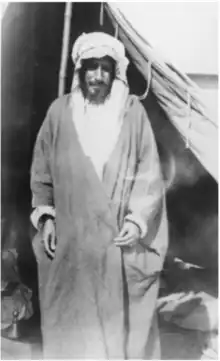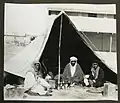Faisal al-Duwaish
Faisal bin Sultan al-Duwaish (Arabic: فيصل بن سلطان .الدويش المطيري c. 1882 – 1931) was Prince of the Mutair tribe[1] and one of Arabia's Ikhwan leaders,[2] who assisted Abdulaziz in the unification of Saudi Arabia. The mother of Faisal bin Sultan was from the Ajman tribe and the sister of Dhaydan bin Hithlain, another Ikhwan leader and sheikh of the Ajman tribe.[1]
Faisal al-Duwaish | |
|---|---|
 | |
| Born | 1882 |
| Died | 3 October 1931 (aged 48–49) Riyadh |
| Allegiance | |
| Service/ | |
| Years of service | 1912–1929 |
| Battles/wars | Unification of Saudi Arabia |
| Spouse(s) |
|
| Children |
|
| Relations | Dhaydan bin Hithlain (uncle) |
Ikhwan and death
Although he joined Ikhwan in 1912 when it was established, his embracement of the Wahhabi approach took place in 1918.[3] Al Duwaish commanded the attack on Kuwait forces in Hamdh on 16 May 1920. Later, in 1920, he led an attack by the Ikhwan on Kuwait.
Faisal bin Sultan also participated in the capture of Hejaz in 1924–1925, and although he wanted to be the ruler of Madina, the Saudis asked him to leave the region.[4] This incident was one of the reasons for the Ikhwan revolt against Abdulaziz in the next years.[4]
Faisal bin Sultan and other leading Ikhwan leaders did not participate in the meeting held by Abdulaziz in Riyadh in 1928 to settle the conflicts.[4] However, just before the start of the battle against Saudi forces, Faisal bin Sultan met with the Saudis, but it was not a fruitful attempt.[4] He was injured at the 1929 battle of Sabilla, fled Arabia and later surrendered to the British in Kuwait. Sultan was pardoned by his former ruler Abdulaziz upon the request of his sister, Walha.[5] However, he was later jailed in Riyadh where he died in 1931 suffering from an aneurysm.[6]
Gallery
 The surrender of Faisal Al-Dawish
The surrender of Faisal Al-Dawish


 Faisal Al-Dawish on board a British ship
Faisal Al-Dawish on board a British ship A picture of Faisal Al-Dawish before the battle of Jahra
A picture of Faisal Al-Dawish before the battle of Jahra

References
- Talal Sha'yfan Muslat Al Azma (1999). The role of the Ikhwan under 'Abdul'Aziz Al Sa'ud 1916-1934 (PhD thesis). Durham University. pp. 84, 195.
- Arabs of The Desert Dickson
- Rayed Khalid Krymli (1993). The political economy of rentier states: A case study of Saudi Arabia in the oil era, 1950-1990 (PhD thesis). The George Washington University. p. 125. ISBN 979-8-207-91275-2. ProQuest 304080655.
- Abdulaziz Al Fahad (2002). "The 'Imama vs. the 'Iqal: Hadari-Bedouin Conflict and the Formation of the Saudi State". EUI Working Papers. 11: 21, 23–24. hdl:1814/1769. ISSN 1028-3625.
- John S. Habib (1970). The Ikhwan Movement of Najd: Its Rise, Development, and Decline (PhD thesis). University of Michigan. p. v. ISBN 9781083431288. ProQuest 288186259.
- "File 11/44 Leading Personalities in Iraq, Iran & Saudi Arabia' [40v] (80/96), British Library: India Office Records and Private Papers". Qatar Digital Library. Retrieved 19 August 2023.
External links
- KUNA
 Media related to Faisal El Dwaish at Wikimedia Commons
Media related to Faisal El Dwaish at Wikimedia Commons